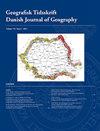一个关于“社区”的故事:柬埔寨北部森林保护项目的边界、地理组成和社会一致性
IF 1.1
4区 社会学
Q4 ENVIRONMENTAL STUDIES
Geografisk Tidsskrift-Danish Journal of Geography
Pub Date : 2016-07-02
DOI:10.1080/00167223.2016.1182440
引用次数: 16
摘要
“社区”的明确概念,作为全球南方保护和发展项目的关键角色,是常见的。森林养护方案中关于“土著人民”或“依赖森林的社区”的叙述盛行,把“社区”描绘成同质和谐的实体。在本研究中,我们以柬埔寨北部一个基于社区的森林保护项目为例,将“社区”作为一个结构展开。基于定性访谈、实地观察和文献分析,我们从边界的建立、地理构成和社会一致性等方面考察了“社区”的构建。我们不仅发现森林“社区”边界的建立是由强大的外部行动者主导的,而不是“社区成员”本身,而且“社区”的空间构成是复杂的,影响了当地人从项目中受益的能力。我们还发现,研究的“社区”显示出低水平的社会一致性,主要由农民工组成,而不是共同的政策叙述。考虑到这些不一致,我们讨论了构建“社区”对森林保护项目成功的影响,并主张进行更多的话语和政治分析,以更好地理解、承认和适应当前和未来项目地点的现有和不断变化的条件。本文章由计算机程序翻译,如有差异,请以英文原文为准。
A story of “communities”: boundaries, geographical composition and social coherence in a forest conservation project, Northern Cambodia
Abstract Explicit notions of “communities”, as key actors in conservation and development projects across the Global South, are common. Narratives about “indigenous people” or “forest-dependent communities” in forest conservation programmes prevail, portraying a picture of “communities” as homogeneous and harmonious entities. In this study, we unfold “communities” as a construct with an empirical example of a community-based forest protection project, Northern Cambodia. Based on qualitative interviews, field observations and document analysis, we examine the “community” construct in terms of establishment of boundaries, geographical composition and social coherence. We not only find that the establishment of forest “community” boundaries are dominated by powerful external actors rather than the “community members” themselves, but that the spatial composition of “communities” is complex, and affects the ability of local people to benefit from the project. We also find that the studied “communities” show low levels of social coherence and mainly consist of migrant farmers, as opposed to common policy narratives. Taking these inconsistencies into account, we discuss implications of constructing “communities” for the success of forest conservation projects, and argue in favour of more discursive and political analyses to better understand, acknowledge and adapt to existing and changing conditions in present and prospective project locations.
求助全文
通过发布文献求助,成功后即可免费获取论文全文。
去求助
来源期刊
CiteScore
5.20
自引率
0.00%
发文量
5
期刊介绍:
DJG is an interdisciplinary, international journal that publishes peer reviewed research articles on all aspects of geography. Coverage includes such topics as human geography, physical geography, human-environment interactions, Earth Observation, and Geographical Information Science. DJG also welcomes articles which address geographical perspectives of e.g. environmental studies, development studies, planning, landscape ecology and sustainability science. In addition to full-length papers, DJG publishes research notes. The journal has two annual issues. Authors from all parts of the world working within geography or related fields are invited to publish their research in the journal.

 求助内容:
求助内容: 应助结果提醒方式:
应助结果提醒方式:


